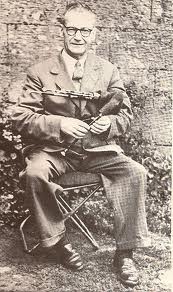Annotation:I'll Get Wedded in My Auld Claes: Difference between revisions
No edit summary |
No edit summary |
||
| Line 2: | Line 2: | ||
---- | ---- | ||
<p><font face="garamond, serif" size="4"> | <p><font face="garamond, serif" size="4"> | ||
'''I'LL GET WEDDED IN MY AULD CLAES'''. AKA - "[[Hexham Quadrille]]." English, Jig. G Major. Standard tuning (fiddle). AABBCC. While a part of the core Northumbrian repertoire (c.f. Billy Pigg's recording), it is more properly categorized as a Borders tune. The jig has also been played by Cape Breton musicians who had it independent of Robin Williamson's book (from which many 'revival' fiddlers learned the tune). Stan Chapman, an influential teacher and fiddler from nearby Nova Scotia, learned it from an old tape of Washabuck, Cape Breton, fiddler Joe MacLean. | '''I'LL GET WEDDED IN MY AULD CLAES'''. AKA - "[[Hexham Quadrille]]," "We'll all be wed in our old claes, we canna tell when we'll get new." English, Jig. England, Northumberland. G Major. Standard tuning (fiddle). AABBCC. While a part of the core Northumbrian repertoire (c.f. Billy Pigg's recording), it is more properly categorized as a Borders tune. The title (as "We'll all be wed in our old claes") appears in Henry Robson's list of popular Northumbrian song and dance tunes ("The Northern Minstrel's Budget"), which he published c. 1800. The jig has also been played by Cape Breton musicians who had it independent of Robin Williamson's book (from which many 'revival' fiddlers learned the tune). Stan Chapman, an influential teacher and fiddler from nearby Nova Scotia, learned it from an old tape of Washabuck, Cape Breton, fiddler Joe MacLean. | ||
<br> | <br> | ||
<br> | <br> | ||
Revision as of 15:47, 13 December 2015
Back to I'll Get Wedded in My Auld Claes
I'LL GET WEDDED IN MY AULD CLAES. AKA - "Hexham Quadrille," "We'll all be wed in our old claes, we canna tell when we'll get new." English, Jig. England, Northumberland. G Major. Standard tuning (fiddle). AABBCC. While a part of the core Northumbrian repertoire (c.f. Billy Pigg's recording), it is more properly categorized as a Borders tune. The title (as "We'll all be wed in our old claes") appears in Henry Robson's list of popular Northumbrian song and dance tunes ("The Northern Minstrel's Budget"), which he published c. 1800. The jig has also been played by Cape Breton musicians who had it independent of Robin Williamson's book (from which many 'revival' fiddlers learned the tune). Stan Chapman, an influential teacher and fiddler from nearby Nova Scotia, learned it from an old tape of Washabuck, Cape Breton, fiddler Joe MacLean.
Source for notated version: Northumbrian small-pipes player Billy Pigg (1902-1968).

Printed sources: Williamson (English, Welsh, Scottish and Irish Fiddle Tunes), 1976; p. 38.
Recorded sources: Leader Records LEA 4006, "Billy Pigg, The Border Minstrel" (1971). Rounder CD 7040, Stan Chapman - "MacKinnon's Brook: Traditional fiddle music of Cape Breton, vol 4" (2009).
See also listing at:
Alan Snyder's Cape Breton Fiddle Recordings Index [1]
